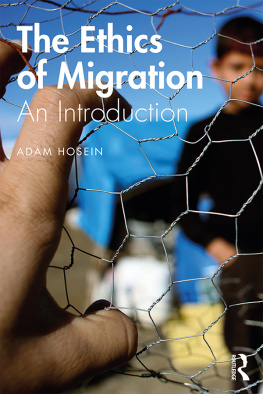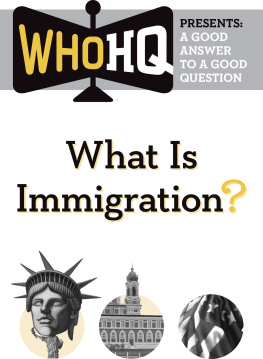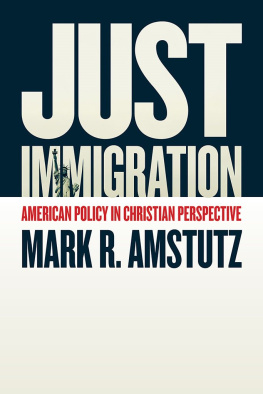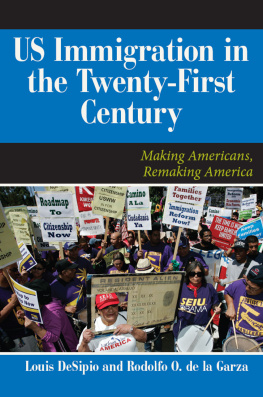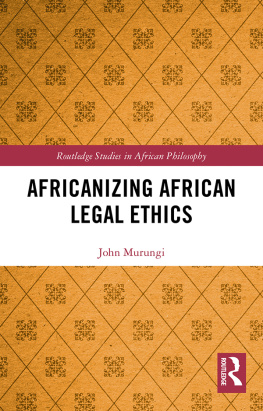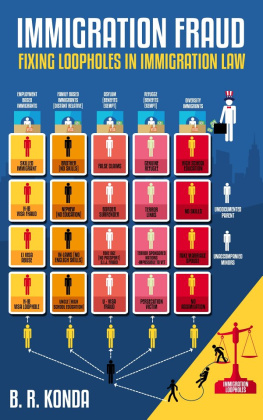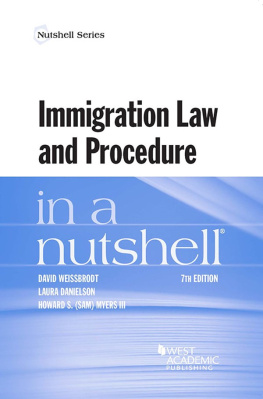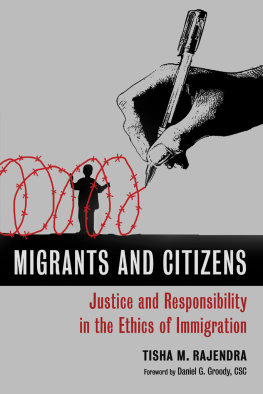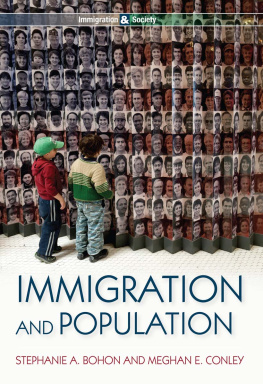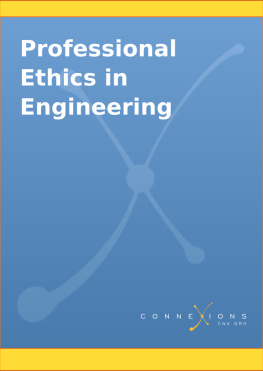Carens - The Ethics of Immigration
Here you can read online Carens - The Ethics of Immigration full text of the book (entire story) in english for free. Download pdf and epub, get meaning, cover and reviews about this ebook. City: United States;Verenigde Staten, year: 2015;2013, publisher: Oxford University Press, genre: Politics. Description of the work, (preface) as well as reviews are available. Best literature library LitArk.com created for fans of good reading and offers a wide selection of genres:
Romance novel
Science fiction
Adventure
Detective
Science
History
Home and family
Prose
Art
Politics
Computer
Non-fiction
Religion
Business
Children
Humor
Choose a favorite category and find really read worthwhile books. Enjoy immersion in the world of imagination, feel the emotions of the characters or learn something new for yourself, make an fascinating discovery.

The Ethics of Immigration: summary, description and annotation
We offer to read an annotation, description, summary or preface (depends on what the author of the book "The Ethics of Immigration" wrote himself). If you haven't found the necessary information about the book — write in the comments, we will try to find it.
The Ethics of Immigration — read online for free the complete book (whole text) full work
Below is the text of the book, divided by pages. System saving the place of the last page read, allows you to conveniently read the book "The Ethics of Immigration" online for free, without having to search again every time where you left off. Put a bookmark, and you can go to the page where you finished reading at any time.
Font size:
Interval:
Bookmark:
The Ethics of Immigration
JOSEPH H. CARENS


Oxford University Press is a department of the University of Oxford.
It furthers the Universitys objective of excellence in research, scholarship, and education by publishing worldwide.
Oxford New York
Auckland Cape Town Dar es Salaam Hong Kong Karachi Kuala Lumpur Madrid Melbourne Mexico City Nairobi New Delhi Shanghai Taipei Toronto
With offices in
Argentina Austria Brazil Chile Czech Republic France Greece Guatemala Hungary Italy Japan Poland Portugal Singapore South Korea Switzerland Thailand Turkey Ukraine Vietnam
Oxford is a registered trademark of Oxford University Press in the UK and certain other countries.
Published in the United States of America by
Oxford University Press
198 Madison Avenue, New York, NY 10016
Oxford University Press 2013
All rights reserved. No part of this publication may be reproduced, stored in a retrieval system, or transmitted, in any form or by any means, without the prior permission in writing of Oxford University Press, or as expressly permitted by law, by license, or under terms agreed with the appropriate reproduction rights organization. Inquiries concerning reproduction outside the scope of the above should be sent to the Rights Department, Oxford University Press, at the address above.
You must not circulate this work in any other form and you must impose this same condition on any acquirer.
Library of Congress Cataloging-in-Publication Data
Joseph H. Carens
The ethics of immigration / Joseph H. Carens.
pages cm
Includes bibliographical references and index.
ISBN 9780199933839 (hardback : alk. paper) 1. United StatesEmigration and immigrationGovernment policy. 2. Illegal aliensUnited StatesGovernment policy. 3. Emigration and immigrationMoral and ethical aspects. I. Title.
JV6477.C37 2013
172.2dc23
2013011943
1 3 5 7 9 8 6 4 2
Printed in the United States of America on acid-free paper
For Jenny, Michael, and Daniel
It is customary to save the dedication to the end of ones acknowledgments, but I have over thirty years worth of people to thank, and I fear some readers might not make it to the end. So, Ill begin with what is most important to me. I get great satisfaction from my work, but I have always known that my family mattered more. I have tried to live in accordance with that knowledge and not to sacrifice time with them to my work. For the most part, I have succeeded in that endeavor, and my life has been much the richer for it. I dedicate this book with love and gratitude to Jenny and Michael and Daniel.
I first started thinking about the ethics of immigration in 1980. I had been invited to participate in an APSA faculty seminar directed by Nan Keohane. The price of admission to the seminar was a commitment to write a paper on citizenship. While casting around for a topic, I found myself reading stories about Haitians trying to get to Florida to ask for asylum as refugees. I had no preconceptions about what Americans (or anyone else) should do about the Haitians, but I felt intuitively torn between the feeling that there was something wrong in excluding people in such obvious need and the worry that admitting everyone with comparable claims would be overwhelming and would be especially harmful to those already most disadvantaged in America. I wanted to look at the political theory literature on immigration to help me think about this topic, but I discovered, to my surprise, that there was no such literature. So, I decided to think about what the leading liberal theories of the day would entail if applied to this topic. Again I was surprised. I concluded that all of the theories I was considering (Rawls, Nozick, utilitarianism) should support open borders (with minor qualifications). For various reasons, I put the paper aside for a few years. By the time I returned to it, Michael Walzer had published his seminal piece on membership. In that essay Walzer argued that states are morally entitled to exercise discretionary control over immigration, at least for the most part. Engaging with Walzers essay clarified my thinking, but it only served to confirm my earlier view that liberal democratic principles entail a commitment to open borders. So, I added a critical discussion of Walzer, spent a long time polishing and refining my paper, and then sent it off. It was promptlyor, sometimes, not so promptlyturned down by three leading journals: American Political Science Review, Ethics, and Philosophy & Public Affairs. Ill admit to finding these rejections discouraging. I persisted, however, and on my fourth try the paper found a home in Review of Politics.
I thought that my open borders argument was getting at an important truth. At the same time, I recognized that it was not a practical proposal and that it did not provide much guidance for actual policy issues (like the question of how to respond to the Haitians). I was not quite sure how to go about pursuing the ethics of immigration further. Then, in 1987, I was invited to a conference on comparative citizenship and naturalization policies organized by the German Marshall Fund. This conference involved administrators and policymakers from several European states along with academics who were mainly lawyers or empirical scholars. I was the only political theorist. I knew that this audience would not be much interested in an abstract philosophical discussion of Rawls, Nozick, and open borders. They wanted to know what European states should do about the immigrants in their midst, people who had arrived as temporary workers but had settled permanently. Fortunately, I had a political theorist to rely upon in addressing this issue: Michael Walzer. In the very same article in which he defended discretionary control over immigration, Walzer argued that if democratic states do admit immigrants, they have to put the immigrants on a path to citizenship. I found Walzers argument compelling and used it as the foundation for my own analysis in my contribution to the conference.
My agreement with Walzer on access to citizenship did not change my views about our disagreement over admissions. Instead it set me to wondering about how to connect these two quite different sorts of argument and how best to identify the moral issues raised by immigration. Some of these moral issues seemed to grow out of immediate, contingent circumstances. Others seemed more enduring and more tied to the central requirements of democratic principles. For some issues (like access to citizenship), what I thought justice required was already practiced by some democratic states and was not unimaginable in most of the others. For other issues (like open borders), what I thought justice required seemed far removed from anything feasible in the foreseeable future. And so I began to try to sort out these puzzles, hoping to provide an overview of the normative issues raised by immigration and to say something about the different ways in which one might approach such a topic.
I did not think that it would take me as long as it has to produce this book. By the early 1990s I had already written several papers on immigration. Indeed, in 1993 Philippe van Parijs organized a workshop on my draft manuscript at Louvain-la-Neuve in Belgium. The workshop was helpful, but I felt that my manuscript did not fully hang together. I wanted to produce a sustained and coherent analysis, not just a collection of articles. In retrospect I can see that it was a mistake not to publish what I had then. That manuscript already advanced some of the key themes about social membership and open borders that are found in this book. The earlier version did not solve all of the problems, but then no book does, including this one. If I had published a book then, it would have advanced the conversation, and it certainly would have advanced my career. Still, one is fortunate indeed in life if ones mistakes have such limited negative consequences as this mistake had for me. I did not keep my thoughts to myself but published them as articles. So, my ideas did reach a part of the scholarly community, if not the wider audience that a book can command. Moreover, I already had a secure position in a department that I regarded then (and still regard) as the best place in the world for a political theorist. So, whatever professional opportunities I missed by not publishing the book sooner were not all that important in the end.
Next pageFont size:
Interval:
Bookmark:
Similar books «The Ethics of Immigration»
Look at similar books to The Ethics of Immigration. We have selected literature similar in name and meaning in the hope of providing readers with more options to find new, interesting, not yet read works.
Discussion, reviews of the book The Ethics of Immigration and just readers' own opinions. Leave your comments, write what you think about the work, its meaning or the main characters. Specify what exactly you liked and what you didn't like, and why you think so.

